Doing Effective Keyword Research for SEO in 2025

 Keyword research is the cornerstone of any successful SEO strategy, and understanding it is more crucial than ever. Studies reveal that 70 percent of marketers believe keyword research is essential for driving traffic and conversions. But here’s the kicker: many still treat it as a simple checklist instead of a strategic art. The truth is, effective keyword research is about more than just numbers; it’s about tapping into the psychology of your audience to uncover their true intent. This approach transforms your content from just meeting search demands to genuinely resonating with users.
Keyword research is the cornerstone of any successful SEO strategy, and understanding it is more crucial than ever. Studies reveal that 70 percent of marketers believe keyword research is essential for driving traffic and conversions. But here’s the kicker: many still treat it as a simple checklist instead of a strategic art. The truth is, effective keyword research is about more than just numbers; it’s about tapping into the psychology of your audience to uncover their true intent. This approach transforms your content from just meeting search demands to genuinely resonating with users.
Table of Contents
- Understand What Effective Keyword Research Is
- Ways To Find Great Keywords
- Analyze Your Keyword List
- How To Apply Keywords To Content And Track
Quick Summary
| Takeaway | Explanation |
|---|---|
| Strategic Understanding of Keyword Intent | Recognizing the three primary types of user intent (informational, navigational, transactional) is crucial for creating content that meets user needs effectively. |
| Utilization of Diverse Keyword Research Tools | Leveraging tools such as Google Keyword Planner, SEMrush, and Ahrefs provides comprehensive insights into keyword metrics, including search volume and difficulty, enhancing keyword discovery. |
| Importance of Keyword Metrics in Analysis | Evaluating keywords based on search volume, keyword difficulty, click-through rate, and cost-per-click aids in determining their potential impact on traffic and business goals. |
| Content Clustering for Topical Authority | Developing content clusters around a central topic enhances SEO and establishes authority, as interconnected content signals relevance and expertise to search engines. |
| Ongoing Performance Tracking | Employing tools like Google Analytics and Google Search Console to monitor keyword performance metrics enables continuous optimization of keyword strategies in response to changing trends. |
Understand what effective keyword research is
Keyword research is the strategic process of identifying and analyzing search terms that people enter into search engines, serving as a critical foundation for digital marketing and search engine optimization (SEO) strategies. At its core, effective keyword research goes beyond simply finding popular words – it's about understanding the precise language your target audience uses when searching for information, products, or services related to your business.
The Fundamental Purpose of Keyword Research
The primary goal of keyword research is to uncover the exact phrases and terms potential customers use during their online search journey. Research from Moz reveals that understanding searcher intent is crucial, as it helps businesses align their content directly with what users are actually seeking. This alignment is not just about matching words, but comprehending the underlying motivation behind a search query.
Effective keyword research involves multiple layers of analysis. It requires examining search volume, which indicates how many people are searching for a particular term, and keyword difficulty, which assesses how challenging it might be to rank for that specific keyword. Marketers and SEO professionals use these insights to develop content strategies that can attract more targeted organic traffic.
Identifying User Intent and Search Behavior
Successful keyword research is fundamentally about decoding user intent. A study by Search Engine Journal demonstrates that keywords can be categorized into three primary intent types: informational (seeking knowledge), navigational (looking for a specific website), and transactional (ready to make a purchase). By understanding these intent categories, businesses can craft content that precisely matches what searchers are looking to find.
For instance, a keyword like "how to fix a leaky faucet" indicates an informational intent, where the user wants step-by-step guidance. In contrast, "buy kitchen faucet online" suggests a transactional intent, where the searcher is prepared to make a purchase. The nuanced understanding of these intents allows content creators to develop highly targeted, relevant content that speaks directly to the user's needs.
Strategic Approaches to Keyword Research
Effective keyword research is not a one-time task but an ongoing process of discovery and refinement. According to SEMrush, successful strategies involve using a combination of tools and techniques. This includes leveraging keyword research platforms, analyzing competitor strategies, exploring long-tail keywords, and continuously monitoring search trend shifts.
Professional marketers recommend creating a comprehensive keyword strategy that balances high-volume, competitive keywords with more specific, lower-competition long-tail keywords. This approach ensures a balanced strategy that can attract both broad audience segments and highly targeted niche markets. By continuously analyzing and adapting keyword strategies, businesses can maintain a competitive edge in the ever-evolving digital landscape.
Ways to find great keywords
Discovering exceptional keywords requires a systematic and multifaceted approach that combines advanced tools, strategic thinking, and deep understanding of your target audience. The process of finding great keywords is not about randomly selecting popular terms, but about uncovering precise search phrases that connect your content with the right audience at the right moment.
Leveraging Powerful Keyword Research Tools
Google Keyword Planner remains a fundamental resource for keyword discovery, offering insights into search volumes, competition levels, and potential cost-per-click for advertising. Professional marketers recommend using multiple tools to cross-reference data and gain a comprehensive view. Tools like SEMrush and Ahrefs provide advanced keyword research capabilities, allowing users to explore keyword difficulty, search trends, and competitive landscapes. Beyond traditional keyword research platforms, Google Suggest and Google Trends offer unique insights into real-time search behaviors. By typing partial queries into search engines, marketers can uncover long-tail keywords and understand how users naturally phrase their search queries. These tools reveal the evolving language and interests of target audiences, enabling more nuanced and adaptive keyword strategies.
Beyond traditional keyword research platforms, Google Suggest and Google Trends offer unique insights into real-time search behaviors. By typing partial queries into search engines, marketers can uncover long-tail keywords and understand how users naturally phrase their search queries. These tools reveal the evolving language and interests of target audiences, enabling more nuanced and adaptive keyword strategies.
Exploring Competitive and Related Keyword Strategies
Competitor analysis plays a crucial role in identifying potential keyword opportunities. By examining the keywords that successful competitors rank for, businesses can discover gaps in their own content strategy and uncover high-potential search terms. Advanced SEO professionals use techniques like examining competitor website content, analyzing their metadata, and studying their top-performing pages to extract valuable keyword insights.Long-tail keywords represent another powerful strategy for finding great keywords. Research from Moz indicates that these more specific, conversational phrases often have lower competition and higher conversion potential. For example, instead of targeting a broad term like "running shoes," a more effective approach might be to target "best lightweight running shoes for marathon training," which speaks directly to a specific user intent.
Advanced Keyword Discovery Techniques
 Innovative keyword research extends beyond traditional tools and requires creative approaches. Search Engine Journal recommends exploring forums, social media discussions, and customer feedback channels to uncover authentic language and emerging search trends. Reddit, Quora, and industry-specific forums can provide raw, unfiltered insights into how people discuss topics related to your business.
Innovative keyword research extends beyond traditional tools and requires creative approaches. Search Engine Journal recommends exploring forums, social media discussions, and customer feedback channels to uncover authentic language and emerging search trends. Reddit, Quora, and industry-specific forums can provide raw, unfiltered insights into how people discuss topics related to your business.
Voice search and conversational keywords are becoming increasingly important in keyword research. According to Google, nearly 20% of all searches are now performed using voice technology, which means keywords need to sound more natural and match conversational speech patterns. This shift requires marketers to think beyond traditional keyword structures and consider how people actually speak when searching for information.
By combining technical tools, competitive analysis, and creative exploration, businesses can develop a robust keyword research strategy that captures the nuanced ways users search for information online. The key is to remain flexible, continuously learn, and adapt to the ever-changing digital landscape.
Analyze your keyword list
After compiling an extensive list of potential keywords, the critical next step is a comprehensive and strategic analysis that transforms raw data into actionable insights. The goal of keyword list analysis is not merely to count search volumes but to understand the nuanced potential of each keyword in driving meaningful organic traffic and achieving specific marketing objectives.
Evaluating Keyword Metrics and Performance Potential
SEMrush research highlights that effective keyword analysis requires examining multiple critical metrics beyond simple search volume. Marketers must consider keyword difficulty, which indicates how challenging it will be to rank for a specific term, and search intent, which reveals the underlying motivation behind user queries.Key metrics to assess include:
- Search volume: Number of monthly searches
- Keyword difficulty: Competitive ranking complexity
- Click-through rate (CTR): Potential organic traffic generation
- Cost-per-click (CPC): Advertising value and commercial intent
Professional SEO strategists recommend creating a scoring system that weights these metrics according to your specific business goals, allowing for a more nuanced evaluation of keyword potential.
Segmenting Keywords by User Intent and Business Objectives
Research from Moz emphasizes the importance of categorizing keywords based on user intent. Keywords can be classified into three primary categories: informational (seeking knowledge), navigational (finding a specific website), and transactional (ready to make a purchase). By segmenting keywords into these intent categories, businesses can develop more targeted content strategies that directly address user needs.For example, a keyword like "laptop buying guide" suggests an informational intent, while "buy MacBook Pro online" indicates a transactional intent. Understanding these distinctions allows marketers to create content that precisely matches user expectations and increases the likelihood of engagement and conversion.
Advanced Keyword Clustering and Content Strategy
Google's current SEO guidelines recommend moving beyond individual keyword optimization towards topic clustering. This approach involves grouping related keywords into comprehensive content themes that demonstrate topical authority. By creating interconnected content that comprehensively covers a subject, websites can improve their overall search rankings and provide more value to users.Advanced keyword analysis involves identifying semantic relationships between keywords, understanding their contextual relevance, and developing content strategies that address multiple related search queries. Tools like Ahrefs offer sophisticated clustering capabilities that help marketers understand these intricate keyword relationships.
Ultimately, successful keyword list analysis is an iterative process that requires continuous monitoring, refinement, and adaptation. By combining data-driven insights with a deep understanding of user behavior, businesses can develop keyword strategies that not only improve search visibility but also create meaningful connections with their target audience.
How to apply keywords to content and track
Successful keyword implementation is a strategic art that goes beyond simply inserting search terms into content. It requires a nuanced approach that balances SEO optimization with genuine, valuable content creation that resonates with both search engines and human readers.
Strategic Keyword Placement and Integration
Google's SEO guidelines emphasize the importance of natural keyword integration. Keywords should be incorporated seamlessly into content, focusing on primary placement areas such as:- Page titles
- First paragraph
- Headings and subheadings
- Meta descriptions
- Image alt text
- URL structure
Professional content creators recommend using keywords contextually, ensuring they flow naturally within the text. Moz research suggests that keyword stuffing can actually harm search rankings, so the emphasis should be on creating high-quality, informative content that organically includes target keywords.
Content Clustering and Topical Authority
HubSpot's content strategy recommends developing content clusters that explore a central topic comprehensively. This approach involves creating a main pillar page that provides an overview of a broad topic, supported by multiple related content pieces that link back to the main page. By developing interconnected content, businesses can demonstrate topical expertise and improve overall search engine visibility.For example, if "digital marketing" is the main topic, supporting content might include detailed articles about social media marketing, email marketing, content marketing, and pay-per-click advertising. Each piece links back to the main pillar content, creating a robust network of related information that search engines recognize as authoritative.
Tracking and Measuring Keyword Performance
Google Analytics and Google Search Console provide essential tools for monitoring keyword performance. Key metrics to track include:- Organic search traffic
- Average page ranking
- Click-through rates
- Conversion rates
- Bounce rates
Continuous monitoring allows businesses to adapt their keyword strategies, identifying which terms are driving traffic and which might need refinement. The digital landscape is dynamic, so successful keyword application requires ongoing analysis and adjustment.
Effective keyword implementation is a sophisticated process that combines technical SEO knowledge with creative content development. By focusing on providing genuine value to users while strategically incorporating keywords, businesses can improve their search visibility and connect more meaningfully with their target audience.
Frequently Asked Questions
What is keyword research in SEO?
Keyword research is the process of identifying and analyzing search terms that users enter into search engines, helping businesses optimize their content to align with user intent and improve organic search traffic.
How do I identify user intent in keyword research?
User intent can be categorized into three main types: informational (seeking knowledge), navigational (looking for a specific website), and transactional (ready to make a purchase). Understanding these categories helps in crafting targeted content that meets user needs.
What tools can I use for effective keyword research?
Popular keyword research tools include Google Keyword Planner, SEMrush, and Ahrefs. These tools provide insights into search volume, keyword difficulty, and competitive landscape, allowing for informed keyword selection.
How can I organize my keywords for better SEO performance?
You can organize your keywords by segmenting them based on user intent and business objectives. Additionally, applying advanced clustering techniques to group related keywords into content themes can enhance topical authority and search visibility.
Unlock Your SEO Potential with BabyLoveGrowth.ai
Feeling overwhelmed by the complexities of effective keyword research? As highlighted in the article, understanding your audience's intent and the nuances of search behavior is critical to creating content that drives traffic and conversions. But let's face it—manually analyzing competitor strategies and generating SEO-optimized content can be tedious and time-consuming. This is where BabyLoveGrowth.ai steps in.
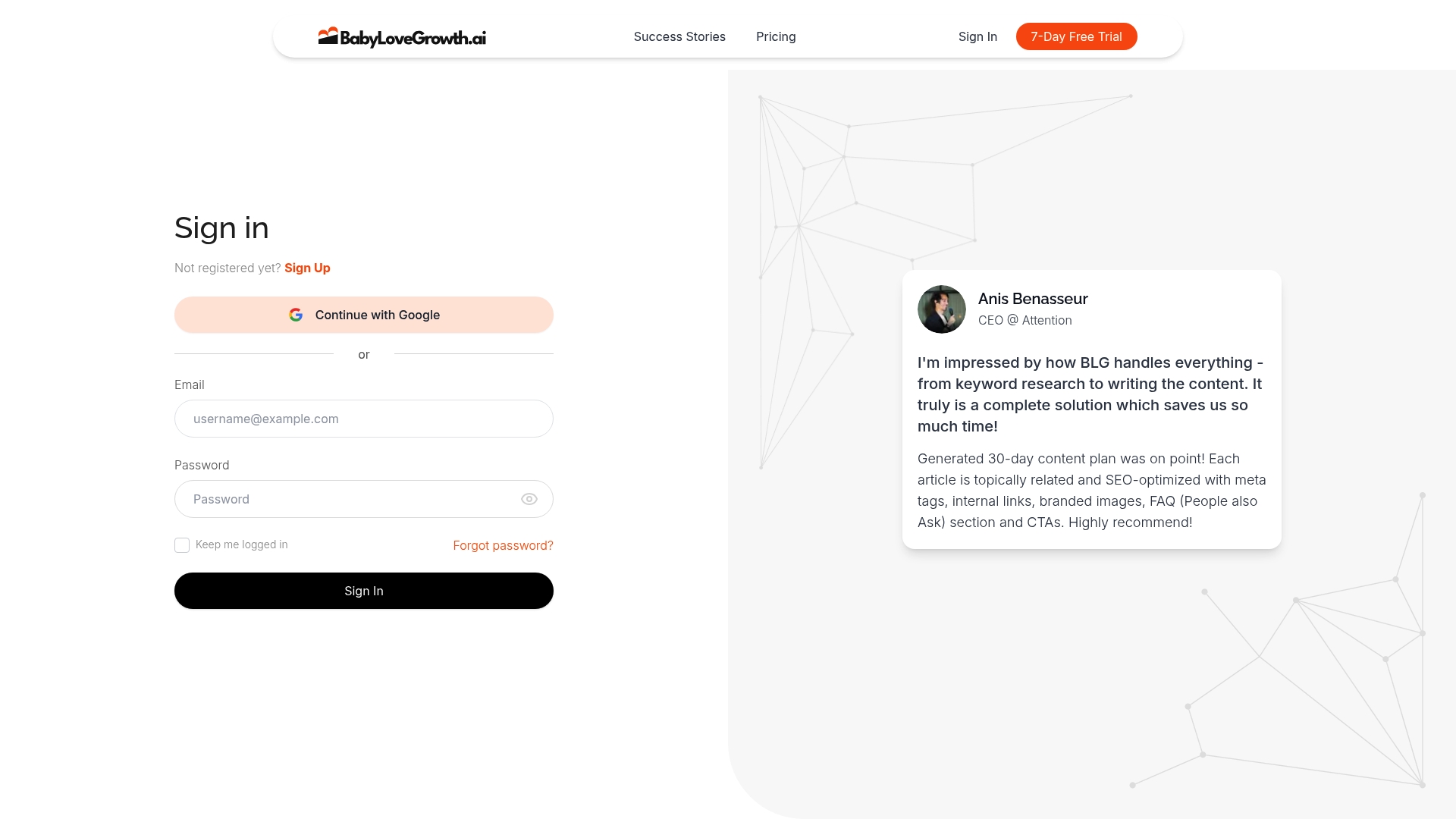
Imagine automating your keyword research process while seamlessly generating tailored content plans. With our innovative three-step solution—in-depth business analysis, a customized 30-day content plan, and automated SEO-optimized article generation—you can scale your online presence efficiently and effectively. Don't let the intricacies of SEO hold you back any longer. Join the ranks of successful businesses leveraging AI to elevate their digital strategy!
Visit https://babylovegrowth.ai today and experience how effortless SEO can be when you let AI work for you.
Recommended Articles
- Effective SEO Marketing Strategy 2025: Step-by-Step
- Definitive Guide: Types of Backlinks in Off Page SEO 2025
- SEO for Healthcare Providers: Proven Strategies to Grow Your Practice
- What is Website Optimization? Your Simple Guide to Boost Site Performance
- How to Increase Website Traffic in 2025: Proven Tips
Smart SEO,
Faster Growth!
Most Read Articles
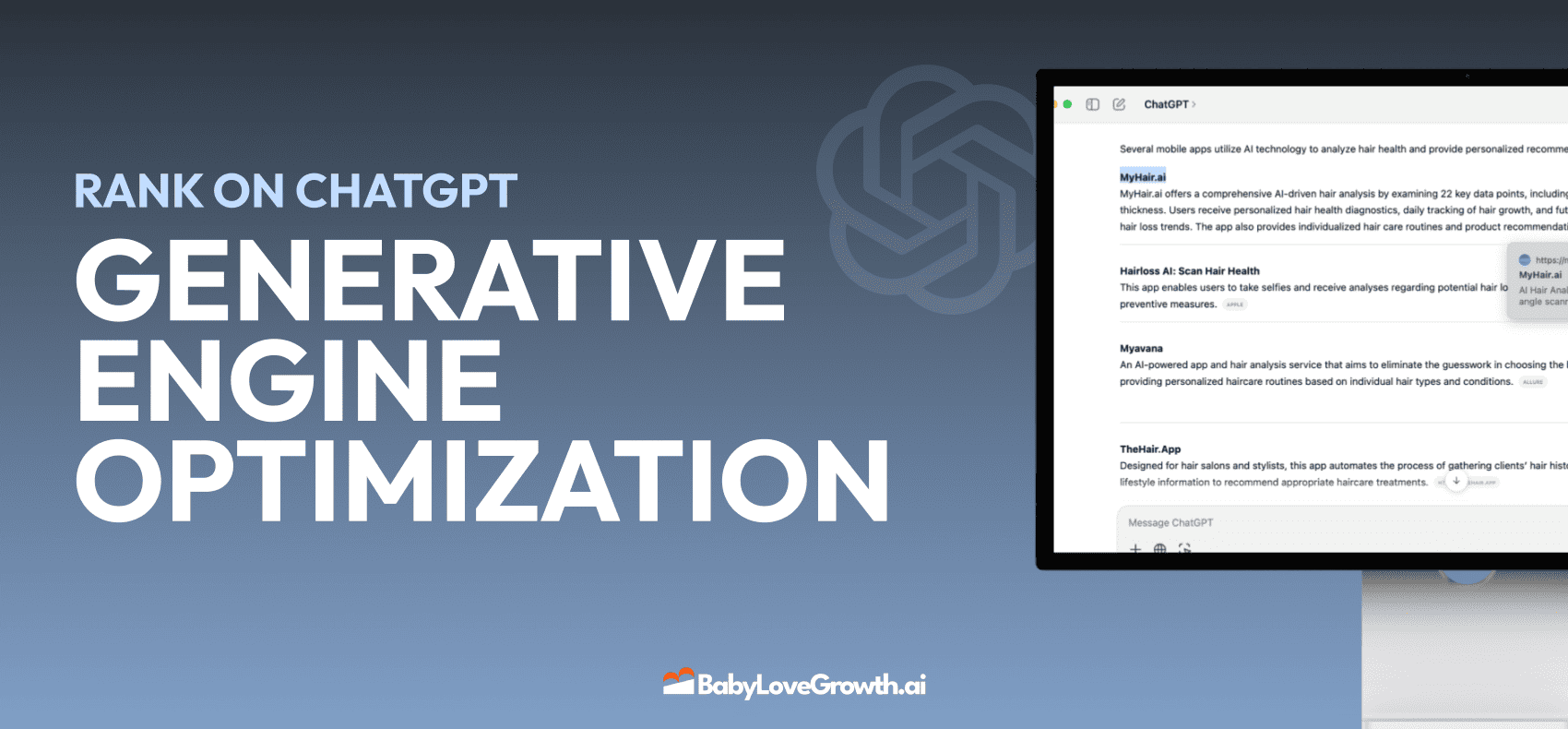
Generative Engine Optimization (GEO)
Learn how Generative Engine Optimization (GEO) helps your content rank in AI search engines like ChatGPT and Google AI. This comprehensive guide explains the differences between SEO and GEO, why it matters for your business, and practical steps to implement GEO strategies for better visibility in AI-generated responses.
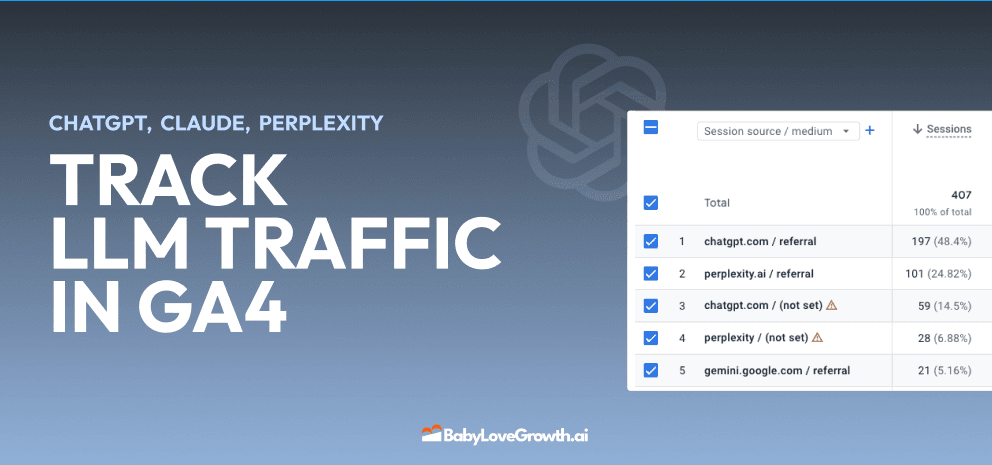
Track LLM Traffic in Google Analytics 4 (GA4)
Learn how to track and analyze traffic from AI sources like ChatGPT, Claude, Perplexity, and Google Gemini in Google Analytics 4. This step-by-step guide shows you how to set up custom filters to monitor AI-driven traffic and make data-driven decisions for your content strategy.
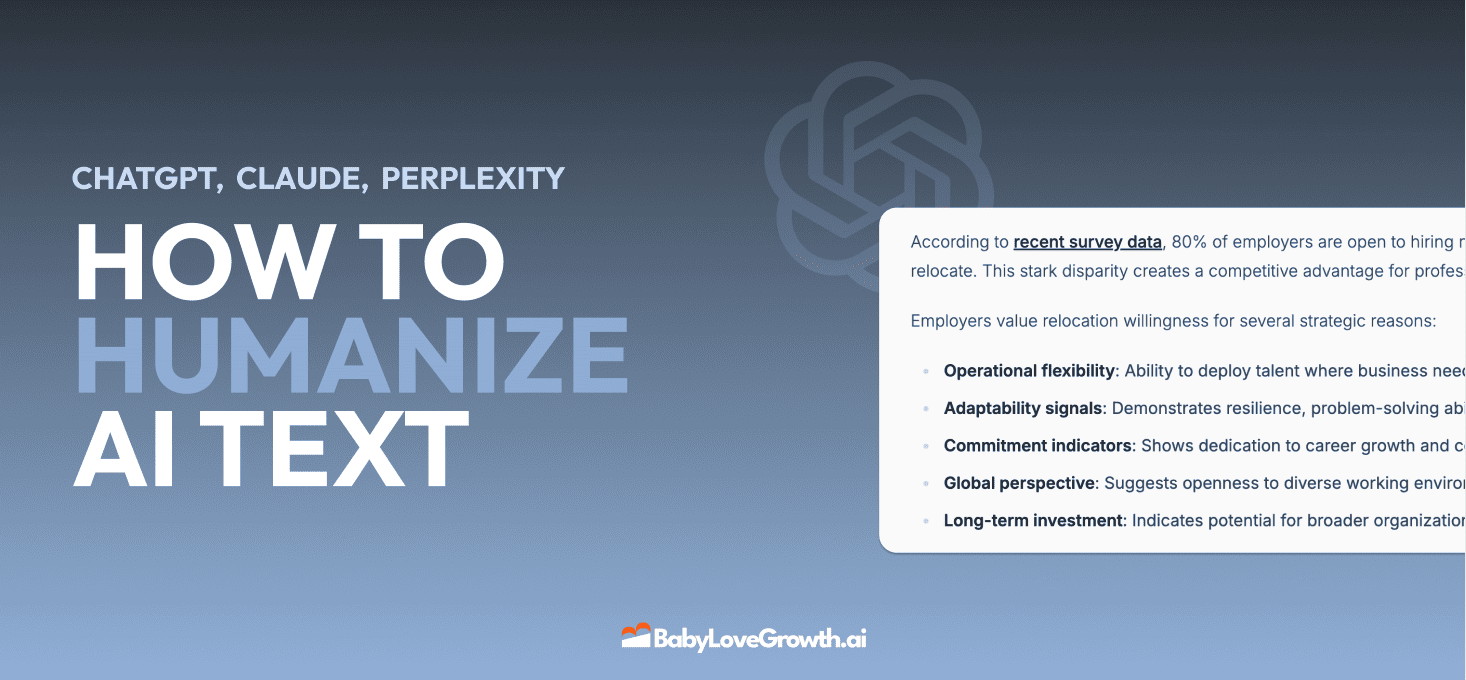
How to Humanize AI Text with Instructions
Learn practical techniques to make AI-generated content sound more natural and human. This guide covers active voice, direct addressing, concise writing, and other proven strategies to transform robotic text into engaging content.
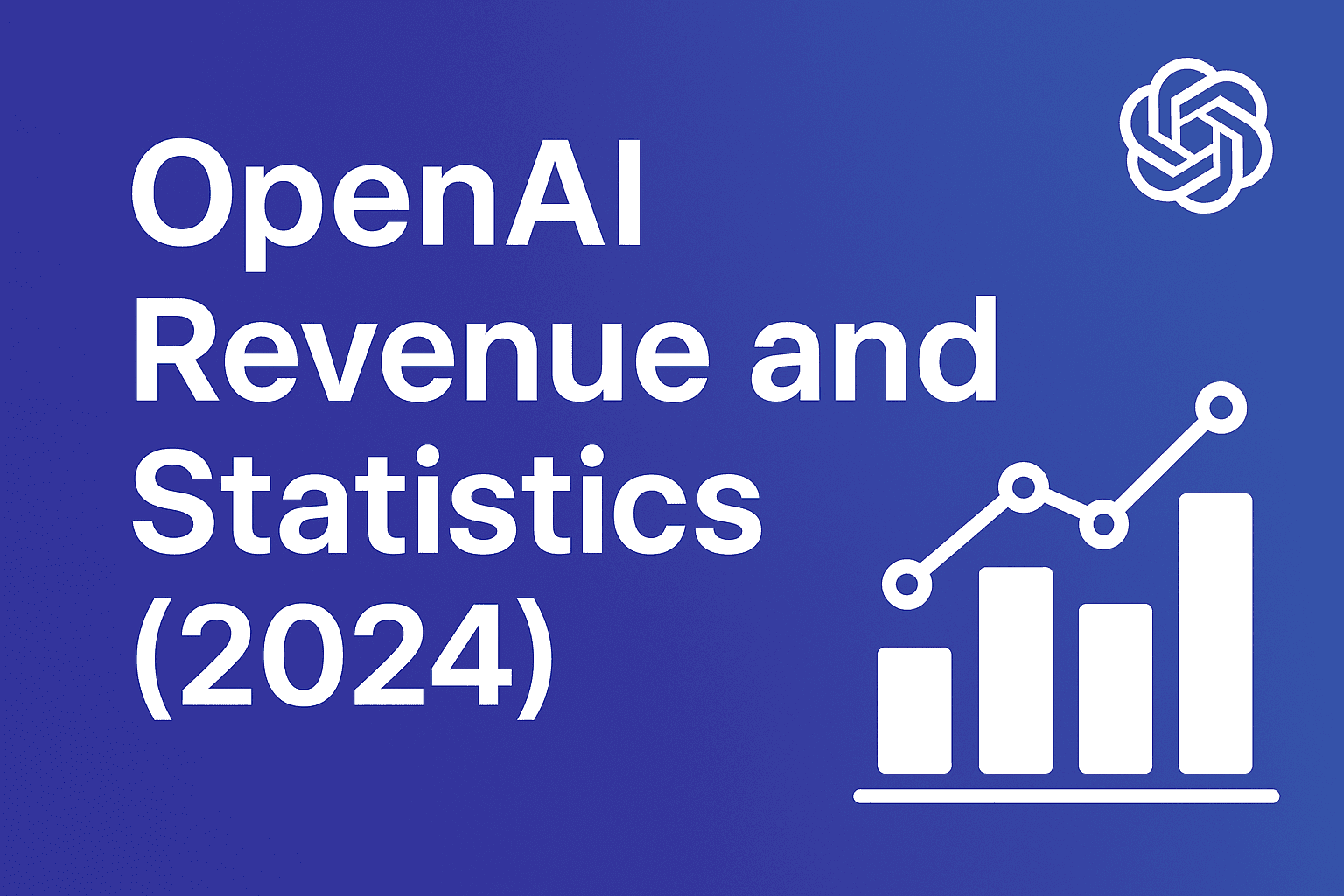
Open AI Revenue and Statistics (2024)
Comprehensive analysis of OpenAI financial performance, user engagement, and market position in 2023. Discover key statistics including $20B valuation, $1B projected revenue, and 100M+ monthly active users.